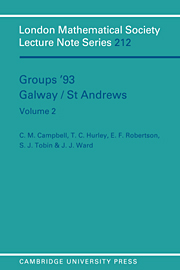Book contents
- Frontmatter
- Contents
- Preface
- Introduction
- An army of cohomology against residual finiteness
- On some questions concerning subnormally monomial groups
- A conjecture concerning the evaluation of products of class-sums of the symmetric group
- Automorphisms of Burnside rings
- On finite generation of unit groups for group rings
- Counting finite index subgroups
- The quantum double of a finite group and its role in conformal field theory
- Closure properties of supersoluble Fitting classes
- Groups acting on locally finite graphs - a survey of the infinitely ended case
- An invitation to computational group theory
- On subgroups, transversals and commutators
- Intervals in subgroup lattices of finite groups
- Amalgams of minimal local subgroups and sporadic simple groups
- Vanishing orbit sums in group algebras of p-groups
- From stable equivalences to Rickard equivalences for blocks with cyclic defect
- Factorizations in which the factors have relatively prime orders
- Some problems and results in the theory of pro-p groups
- On equations in finite groups and invariants of subgroups
- Group presentations where the relators are proper powers
- A condensing theorem
- Lie methods in group theory
- Some new results on arithmetical problems in the theory of finite groups
- Groups that admit partial power automorphisms
- Problems
On some questions concerning subnormally monomial groups
Published online by Cambridge University Press: 19 February 2010
- Frontmatter
- Contents
- Preface
- Introduction
- An army of cohomology against residual finiteness
- On some questions concerning subnormally monomial groups
- A conjecture concerning the evaluation of products of class-sums of the symmetric group
- Automorphisms of Burnside rings
- On finite generation of unit groups for group rings
- Counting finite index subgroups
- The quantum double of a finite group and its role in conformal field theory
- Closure properties of supersoluble Fitting classes
- Groups acting on locally finite graphs - a survey of the infinitely ended case
- An invitation to computational group theory
- On subgroups, transversals and commutators
- Intervals in subgroup lattices of finite groups
- Amalgams of minimal local subgroups and sporadic simple groups
- Vanishing orbit sums in group algebras of p-groups
- From stable equivalences to Rickard equivalences for blocks with cyclic defect
- Factorizations in which the factors have relatively prime orders
- Some problems and results in the theory of pro-p groups
- On equations in finite groups and invariants of subgroups
- Group presentations where the relators are proper powers
- A condensing theorem
- Lie methods in group theory
- Some new results on arithmetical problems in the theory of finite groups
- Groups that admit partial power automorphisms
- Problems
Summary
In his papers [4], [5] and [6] Guan-Aun How described some properties of SM (subnormally monomial) groups. He proved that the class of SM groups is the intersection of the class of CSF (chiefly sub-Frobenius) and the class X of those solvable groups G, for which for all primes p and for all subgroups A, Op(A) has no central p-factor. Among other things, he proved that the class of SM-groups is closed under taking direct products, factor groups and subgroups. First we consider the relation between SM groups, subgroup-closed M-groups and supersolvable groups, showing that these classes are all distinct. For the class of Frobenius groups the first two classes coincide, and they properly contain the class of supersolvable Frobenius groups. For Frobenius complements the three classes are equal. The class SM is not closed under extensions. We show that even the split extension of an abelian group with an SM-group can be non-SM. On the basis of the notion of relative M-groups, we introduce the notion of relative SM-groups. We investigate whether some results which are known to be true for relative M-groups, remain true for relative SM-groups or not. Some of them remain true: we show that every SM-group is relative SM with respect to every abelian normal subgroup. According to [7], if G/N is supersolvable, then G is relative M-group with respect to N. The analogous statement is not true for SM: it may happen that G/N is supersolvable, but G is not relative SM with respect to N. However, if G/N is nilpotent, then G is relative SM with respect to N.
- Type
- Chapter
- Information
- Groups '93 Galway/St Andrews , pp. 314 - 321Publisher: Cambridge University PressPrint publication year: 1995



